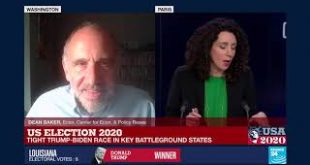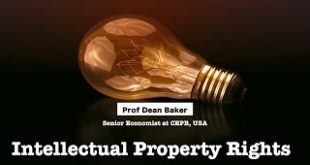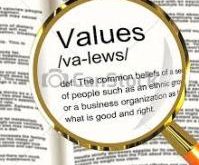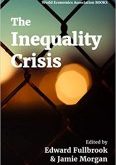Donald Trump’s messaging on jobs and the economy have resonated with voters, says Dean Baker, American economist and co-founder of the Center for Economic and Policy Research. Baker says the president successfully skirted responsibility for the country’s response to coronavirus, which has killed in excess of 230,000. Subscribe to France 24 now: http://f24.my/youtubeEN FRANCE 24 live news stream: all the latest news 24/7 http://f24.my/YTliveEN Visit our website:...
Read More »Intellectual Property Rights Explained by American Economist Prof Dean Baker
Dean Baker is a senior economist at the Center for Economic and Policy Research in Washington, DC. He was the co-founder and co-director of the Center, until he stepped down in 2018. Previously he had been a senior economist at the Economic Policy Institute and an assistant professor at Bucknell University. He has written numerous books and articles. His most recent is Rigged: How Globalization and the Rules of the Modern Economy Were Structured to Make the Rich Richer. Ecoholics is a...
Read More »Is economics value-free?
from Lars Syll I’ve subsequently stayed away from the minimum wage literature for a number of reasons. First, it cost me a lot of friends. People that I had known for many years, for instance, some of the ones I met at my first job at the University of Chicago, became very angry or disappointed. They thought that in publishing our work we were being traitors to the cause of economics as a whole. David Card Back in 1992, New Jersey raised the minimum wage by 18 per cent while its...
Read More »Globalization: Markets are socially constructed “spaces”
from David Westbrook and The Inequality Crisis Suppose we understand markets in fairly simple-minded fashion, as social contexts in which folks buy, sell, and invest. Markets have often been understood individualistically – homo economicus is not a friendly guy – and orthodox economics even proposed “methodological individualism” to be a cardinal intellectual virtue. But the social simply must be stressed at the present juncture. As digital enterprises make inescapably clear, markets are...
Read More »Developments in money and finance absent from conventional macro textbooks.
from Asad Zaman Somebody aptly quipped that ‘Trying to understand the economy without understanding money and finance is like trying to understand how birds fly, without taking the wings into account”. The Hegelian anti-thesis of the orthodox economic position that money is neutral, is the idea that “money is everything”. Economics is just the analysis of monetary flows, both within a society, and globally. Karl Marx describes the change in perspective via the formulae C-M-C’ versus...
Read More »Today’s extremes of wealth and inequality result from the confluence of three historical developments
from David Westbrook and The Inequality Crisis While we may find many sorts of inequality in the United States and elsewhere, this essay is about the specific form of inequality exemplified by Jeff Bezos or Bill Gates, that is, the Himalayan summits of contemporary wealth, mostly in the United States. I would like to suggest that such wealth results from the confluence of three historical developments. First, the social processes referred to under the rubric of “globalization” have...
Read More »The drunk looking for the key
from Yoshinori Shiozawa (originally a comment) This is a part of my essay “Between Math and the Occult” written in 2002 for a journal named “The pleasures of mathematics” (in Japanese) No. 30. There is an interesting parable that points out this. Originally of Arab origin, it was introduced and disseminated in economics by writers like Martin Shubik and Thierry de Montbrial. At midnight, a drunken person was wandering under a lonely streetlight. He seemed to be looking for something....
Read More »Is economics value-free?
from Lars Syll I’ve subsequently stayed away from the minimum wage literature for a number of reasons. First, it cost me a lot of friends. People that I had known for many years, for instance, some of the ones I met at my first job at the University of Chicago, became very angry or disappointed. They thought that in publishing our work we were being traitors to the cause of economics as a whole. David Card Back in 1992, New Jersey raised the minimum wage by 18 per cent while its neighbour...
Read More »The algorithms of wealth accumulation
from Ikonoclast (originally a comment) Capitalism is already an algorithmically determined system on the financial economy / financial accounts side and it has been so at least since the 1850s. The axioms and algorithms of private property, income, finance and national accounting determine the vectors of wealth/money flows and the depositories of wealth/money stocks, all as denominated in the numéraire. This is not to devalue the thesis of machina-economicus. Indeed it magnifies the...
Read More »Economists have no ears
from Steve Keen Thomas Kuhn once famously described textbooks as the vehicle by which students learn how to do “normal science” in an academic discipline. Economic textbooks clearly fulfil this function, but the pity is that what passes for “normal” in economics barely deserves the appellation “science”. Most introductory economics textbooks present a sanitised, uncritical rendition of conventional economic theory, and the courses in which these textbooks are used do little to counter...
Read More » Real-World Economics Review
Real-World Economics Review






